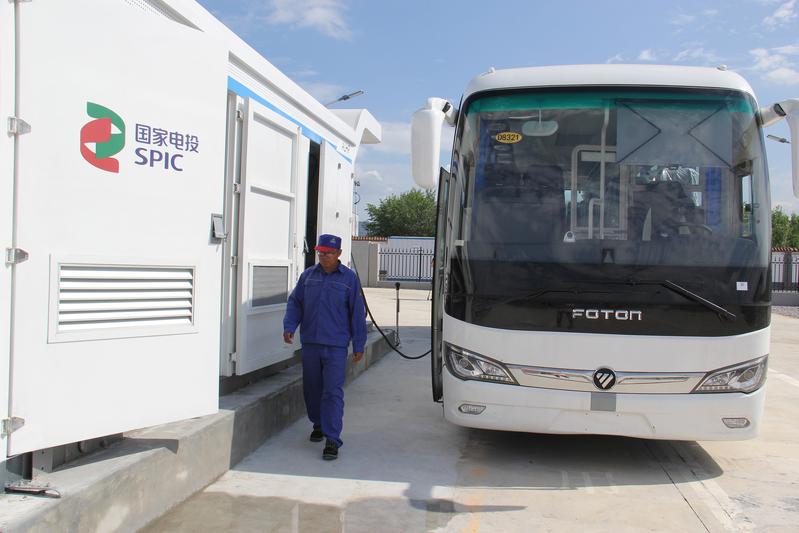 A hydrogen-fueled coach is filled at the hydrogen fueling station in Beijing's Yanqing district. (PHOTO PROVIDED TO CHINA DAILY)
A hydrogen-fueled coach is filled at the hydrogen fueling station in Beijing's Yanqing district. (PHOTO PROVIDED TO CHINA DAILY)
To prepare for the upcoming 2022 Beijing Winter Olympic Games, a newly built hydrogen fueling station in the capital city's northwestern Yanqing district went into operation last month.
The hydrogen fuel produced by the station-with a pressure rating of 70 megapascals-is low-carbon, renewable and clean, and it can be used as a direct replacement for oil and gas, said Wang Yunlong, head of the station.
The refueling station is the second to open in Yanqing for the Games, the first having opened in July last year.
Wang said the new station can refuel 60 to 100 coaches or 200 small and medium-sized buses per day, and that on a full tank, a hydrogen fuel cell vehicle can travel about 500 kilometers.
"Meanwhile, the station will implement universal infrared communication protocols and introduce functions such as automatic detection, control, billing and scanning code payment," he said.
"It takes about half an hour to fill up each vehicle," Wang said, adding that the next step will be to further develop hydrogen energy technology to better serve the Games.
Of late, the capital has accelerated its development of hydrogen power.
According to a plan released by the Beijing Municipal Bureau of Economy and Information Technology on Aug 18, the city has taken the lead in research on hydrogen energy, and by the end of last year, it was home to 150 enterprises and institutions engaged in hydrogen energy research and development.
Under the plan, developing hydrogen power is important to support and promote the energy transition of the Beijing-Tianjin-Hebei region, and it will lay a solid foundation for the coordinated regional development of the hydrogen power industry.
It set the goals of cultivating five to eight enterprises of international influence and of reducing the capital's carbon emissions by 1 million metric tons by 2023.
Some 37 hydrogen refueling stations are expected to be built over the next two years, and 3,000 hydrogen-fueled vehicles are set to hit the roads.
The use of hydrogen-fueled vehicles during the Games is also part of the plan, and 212 fuel cell cars will be put into service in Yanqing. At the end of the Games, the vehicles will be used as buses to connect Yanqing with downtown Beijing.
The Games will be held in Beijing and co-host city Zhangjiakou in Hebei province, from Feb 4 to 20.


